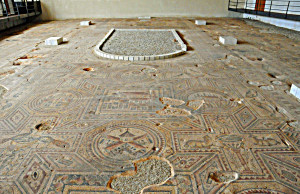In 1985, workers building a road in Taybet al Imam, a small town in northern Syria, uncovered a magnificent church floor buried beneath two feet of dirt. The floor, now protected under a permanent building, illustrates early Christian beliefs and may have provided the inspiration for Islamic images of Paradise.
The 6,000 square-feet floor was once part of the Church of the Holy Martyrs, built in about 442 A.D. The floor still includes bases of columns that once supported the three-nave church. The entire floor is covered with colorful mosaic scenes, making it one of the largest continuous Byzantine mosaics ever found.
The scenes are not like those found in modern churches. No pictures show Jesus or Mary. None show saints or angels. In fact, the floor contains no representations of human or divine beings at all, reflecting the early Christian belief that God forbids the creation of “graven images.” Instead, the floor includes about 20 framed representations of important Christian buildings, including churches in Bethlehem and Jerusalem and a cross-shaped church honoring Simeon the Stylite, a Syrian Christian ascetic who lived atop a column for 37 years.
The most theologically significant scenes illustrate the fifth century idea of Paradise. Many Christians then understood Paradise to be God’s eventual recreation of the Garden of Eden on earth, ushered in by the expected return of Jesus. So, deer drink from a steam overflowing with fish, wild animals run free, and grapes and cool drinks are in abundance. Peacocks, whose bodies were once thought never to decay, drink from a golden chalice, symbolizing God’s promise of immortality. Lions run together with prey among trees laden with fruit.
These images are remarkably similar to the Paradise described in the Quran, a fact not necessarily a coincidence. Muhammad is known to have visited Syrian churches during caravan trips with his uncle. As suggested by a floor panel showing two camels beside a caravan stop, the Church of the Holy Martyrs was along the caravan route north of Damascus. The Islamic images of Paradise may have their roots in a Syrian church.
